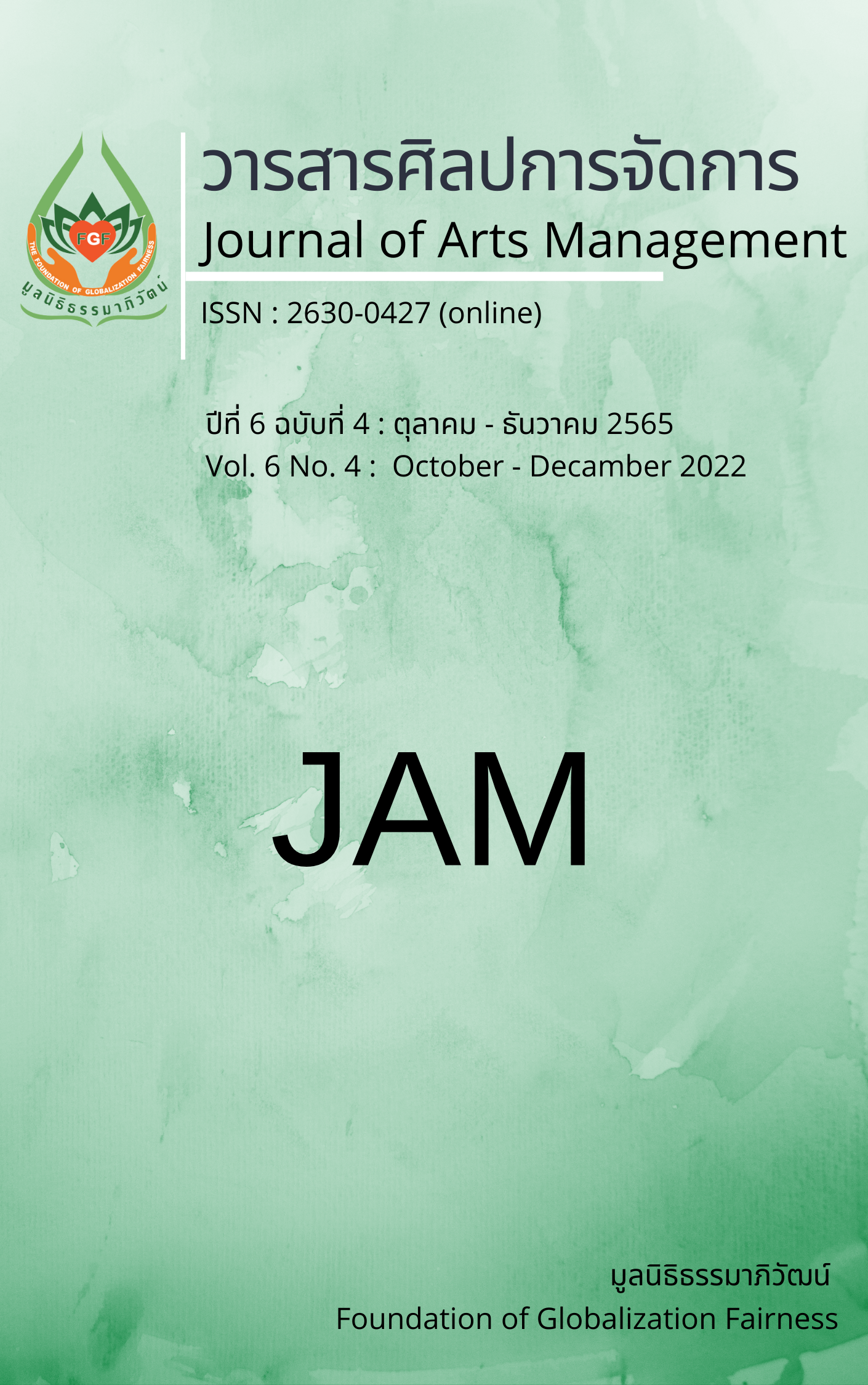The Development of Responsible Tourism Routes for Supporting Corporate Tourists in the Western Region
Main Article Content
Abstract
This article aimed to 1) study the needs, behaviors, and factors affecting responsible travel destination decision-making in the western region of corporate tourists; 2) analyze the potential of tourist attractions that can be arranged with CSR activities for responsible tourist attractions in the western region; and 3) design responsible tourism routes to accommodate corporate tourists in the western region. This study used a mixed-methods technique. Collecting data involved a questionnaire with 400 tourists, an in-depth interview with 65 key informants, and a focus group with 34 stakeholders. Analysis of the data using descriptive statistics with frequency, percentage, mean, standard deviation, regression analysis, and content analysis The research results were found as follows:
1. The majority of corporate tourists were traveling for meetings and seminars. The tourists demanded responsible tourism routes in the western region, consisting of accommodation, tourist attractions, prices, activities, program format, safety, and souvenir products. Their overall need was at the highest level.
2. The potential of being a responsible tourist destination in the western region had an attractive pattern in terms of solving community problems, conserving and restoring nature, and helping the underprivileged, including the handicapped and the elderly. Useful activities in tourist attractions can help society, conveniently accessible tourist attractions, fully equipped facilities, and standardized accommodation.
3. Three responsible tourism routes can be created: environment and nature responsible tourism routes; local people and community responsible tourism routes; and charity and social donation responsible tourism routes.
Article Details

This work is licensed under a Creative Commons Attribution-NonCommercial-NoDerivatives 4.0 International License.
Views and opinions appearing in articles in the Journal of Arts of Management It is the responsibility of the author of the article. and does not constitute the view and responsibility of the editorial team I agree that the article is copyright of the Arts and Management Journal.
References
Bangsomboon, P., & Tapachai, N. (2020). Factors affecting tourism behavior of Thai tourists: Moderating effect of demographic variables. Journal of Administration and Management, 10(1),64-84.
Boondach, P. (2018). Guidelines for tourism development in Tham Le Khao Kob at Huaiyot District, Trang Province[Master’s Thesis, Institute of Development Administration].
Born Distinction Company. (2021). Value adding initiative to strengthen community tourism. Born Distinction Company. www.villagetotheworld.com/meetinthevillage/th.
Buhalis, D. (2000). Marketing the competitive destination in the future. Tourism Management, 21(1), 97-116. https://doi.org/10.1016/S0261-5177(99)00095-3
Caruana, R., Glozer, S., Crane, A., & McCabe, S. (2014). Tourists’ accounts of responsible tourism. Annals of Tourism Research, 46, 115-129. https://doi.org/10.1016/j.annals.2014.03.006
Chittangwattana, B. (2014). Sustainable tourism development. Dharmasarn.
Choibamroong, T. (2009). On roles of the local administrations of Thailand in developing tourism under the economic sufficiency theory. King Prajadhipok’s Institute.
Chryssides, G., & Kaler, J. (1993). An introduction to business ethics. Chapman and Hall.
Designated Areas for Sustainable Tourism Administration. (2020). Responsible tourism activities. Retrieved December, 2020, from https://pogaam.com/demo/wpda1/low-carbon-at-koh-chang /low-carbon-at-koh-chang-csr/csr-case-study/.
Frey, N., & George, R. (2010) Responsible tourism management: The missing link between business owners’ attitudes and behavior in the Cape Town tourism industry. Tourism Management, 31(5), 621-628. https://doi.org/10.1016/j.tourman.2009.06.017
Hanafiah, M., Azman, I., Jamaluddin, M., & Aminuddin, N. (2016). Responsible tourism practices and quality of life: perspective of Langkawi Island communities. Procedia-Social and Behavioral Sciences, 222(23), 406-413. https://doi.org/10.1016/j.sbspro.2016.05.194
Jampajee, S. (2013). International academic conference marketing mix development Khon Kaen Province[Master’s Thesis, Khon Kaen University].
Jaroenwisan, K. (2009). Appropriate marketing model of venue for MICE industry in Thailand [Doctoral dissertation, Maejo University].
Juan, B. D, Leonardo, H. T., & Diana, C. R. (2021). Methodological proposal for the identification of tourist routes in particular region through clustering techniques. Heliyon, 7, 1-9. https://doi.org/10.1016/j.heliyon.2021.e06655
Junead, J., Bunjoon, O., & Jamnongchob. (2020). The development of participatory volunteer tourism of Ban Pamak Karen Village (Pgak’nyau) in Prachuap Khiri Khan Province. Interdisciplinary Sripatum Chonburi Journal, 6(2), 63-77.
Kotler, P., & Keller, K. (2014). Marketing management (15th ed.) Prentice Hall.
Luangchorsiri, W. (2018). Perceptions of corporate social responsibility affecting customer loyalty of the Central Pattana public company limited (CPN) in Bangkok metropolitan area[Master’s Thesis, Srinakharinwirot University].
Mihalic, T. (2016). Sustainable-responsible tourism discourse – Towards‘ responsustable’ tourism. Journal of Cleaner Production, 111, 461-470. https://doi.org/10.1016/j.jclepro.2014.12.062
Ministry of Tourism and Sport. (2020). Wake up Thai, travel to Thailand, awaken the Thailand economy to move forword, build confidence in safe tourism. Ministry of Tourism and Sport. https://www.mots.go.th/News-view.php?nid=12800
Onlamai, W. (2020). Guidelines of development responsible tourism in Ban Sawathi Community Khon Kaen Province. Journal of Sustainable Tourism. 2(1), 74-83.
Pinkaew, W. (2008). Study for ecotourism route proposal in Mueang District, Phetchaburi Province[Master’s Thesis, Srinakharinwirot University].
Putjorn, J. et al. (2020). The development of responsible tourism: Case study Bangkok, Mae Hongson, Phuket and Satun Provinces.
Thailand Science Research and Innovation.
Promdungta, S. (2016). The activity concept of the corporate social responsibility of commercial bank in Thailand[Master’s Thesis, Dhurakijpundit University].
Sanidchan, J. (2021). Factors affecting the tourist’s decision of ecotourism: A case study of Bang Nam Phueng floating market in Samut Prakan[Master’s Thesis, National Institute of Development Administration].
Sittikarn, B., & Jaima, S. (2009). The development of the role of local administrative organizations in promoting and supporting the availability of tourist links by communities in the upper. National Research Council of Thailand.
Soontramethkul, A., Sopha, J., & Phonprasert, P. (2014). Factor affecting in tourism behavior of MICE Tourism in Ubon Ratchathani Province. Journal of Thai Hospitality & Tourism, 9(1), 3-17.
Smith, V. L. (1990). Alternative/responsible tourism seminar. Annals of Tourism Research, 17(3), 479-480. https://doi.org/10.1016/0160-7383(90)90015-J
Thai Responsible Tourism Association. (2020). Responsible tourism. Thai Responsible Tourism Association. www.tourismproduct.tourismthailand.org/uploads/file/a77a2ea520c676c3b732e.pdf.
Thailand Convention & Exhibition Bureau. (2020). MICE doesn’t mean Mice. Thailand Convention & Exhibition Bureau.


